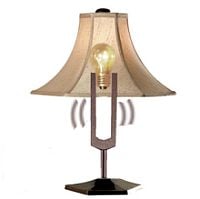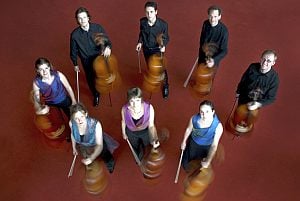
The idea most explored during the two (of three) concerts I attended at the Jewish Community Center of San Francisco was that of alternative tuning. Standard tuning, which allows instruments to make music that sounds relatively the same in any key, must make adjustments to pitches such that their frequencies do not all have simple mathematical ratios to one another. Having the simpler ratios increases the resonance between pitches — the kind of thing you hear when you sing in the shower at just the right sound so that the shower itself vibrates along with your song. Because we're used to standard tuning, scales using the simpler relationships can sound "out of tune" at first, yet the increased resonance adds a whole new quality of tone.
Ben Johnston, who has devoted much of his life to studying acoustics and alternative tunings, contributed what was billed as a world premiere, The Tavern (1998/2008), a setting for baritone and guitar of the poem by the mystic poet Rumi. The words (in Coleman Barks' translation) are wise and thoughtful, and often carry a smile ("Drunks fear the police/but the police are drunks too./People in this town love them both/like different chess pieces").
The music was equally thoughtful, played on frets by John Schneider that he specially constructed to incorporate nonstandard, resonance-rich tunings. At 25 minutes in length, too many "chess-piece" truths came up for examination in similar musical formats, despite Paul Berkolds' fascinating rendition in a simultaneously sung/partially spoken manner. An entire half-program should have been devoted to this piece, but 40 more minutes followed for two additional works (Kagel and Pärt, below), blunting The Tavern's impact.
More Tuning Bright Ideas
Schneider performed two works of his own in the third (Saturday) concert, both of them intriguing and to the point at five minutes each. On Listening to Lu-Tzu (2002) provided an infinity of tunings by using a thick plexiglass dowel as a movable fret on a horizontal guitar. Tombeau for Lou Harrison: Jahla (2006), played on a specially tuned National Steel guitar, could not have been better described than in the program notes: "... resplendent with energetic inertia." Schneider went on with more nonstandard tunings used by the late eccentric composer and instrument-inventor Harry Partch, using another modified guitar for the original version of Barstow (1941), and a washing-machine-sized box with strings on top called a Harmonic Canon for Two Studies on Ancient Greek Scales (1946/1950).
Both were interesting: the latter for its scales and brevity, the former for the random musingness of its words sung/spoken in Schneider's rich voice. Barstow also featured humorous depictions of trucks driving by the desert town, refusing to pick up hitchhiker Partch, left hand on the neck flicking the strings, right hand with thumb in air. Neither grabbed me musically, however.
The initially most amazing use of altered tuning was the concluding work of the festival, Michael Harrison's Tone Clouds (2008). Using a proprietary device with his altered tunings, Harrison was able to turn his piano into a monstrous resonator. He started off quietly, intoning a fundamental note that resonated with eerie effect as he played altered higher pitches. The Del Sol Quartet also played altered tones along with him, but were often drowned out as Harrison's playing of tremolos arpeggios and clusters became ever more obsessive, building to an ear-numbing roar by the end of a 37-minute extravaganza of empty minimalist resonance.
Singing, Shadowing, and Sampling Ideas
 A second idea, that of string players singing along with their playing, received attention by the Cambodian composer Chinary Ung in two works. The best was Spiral X: In Memoriam (2007) from the first concert. In it, the Del Sol String Quartet commemorated the Pol Pot holocaust with a wide range of string effects, and an even wider range of vocalizations: from singing nonsense syllables at first, to growling, and shouting later on. What might have become cheap sound effects in others' hands became moving, against the occasional soaring melodies from the instruments. Similar effects on a less-intense level were to be had from Spiral XI: Mother and Child (2008) in the third concert, performed by Ung's violist wife, Susan.
A second idea, that of string players singing along with their playing, received attention by the Cambodian composer Chinary Ung in two works. The best was Spiral X: In Memoriam (2007) from the first concert. In it, the Del Sol String Quartet commemorated the Pol Pot holocaust with a wide range of string effects, and an even wider range of vocalizations: from singing nonsense syllables at first, to growling, and shouting later on. What might have become cheap sound effects in others' hands became moving, against the occasional soaring melodies from the instruments. Similar effects on a less-intense level were to be had from Spiral XI: Mother and Child (2008) in the third concert, performed by Ung's violist wife, Susan. 
A third idea, or rather an ethos, is Danish composer Bent Sørensen's evocations of "shadows," traces of half-heard atmospheres and melodies that are blurred in unusual textures. In The Shadows of Silence, the texture was in Eva-Maria Zimmermann's solo piano, in a series of flutterings, tremolos, and quickly repeated soft chords that prompted one concertgoer to dub it the "Parkinson's Sonata."
A far more effective piece, in my opinion, was the piano trio Phantasmagoria, played by the Trio con Brio Copenhagen. In it, the same flutterings were augmented by ghostly glissandos like distant ambulance sirens. A few sharp scrapes kept up the variety, but for the most part the music was quiet, with fractured passages evoking distant café music with snippets of tunes sounding like "I could have danced all night" morphing into a long series of relentlessly repeated notes. The music was hard to describe, though the effect was magical — and the highlight of the festival.

A fourth idea did not impress: Brazilian guitarist Chico Mello's use of pastiche in songs for voice and guitar. This trope is distinguished by absurd juxtapositions of bossa nova samples into an overlong number broken either by sudden silences dedicated to John Cage or by weird meowings into the mike. What could have been humorous in more-talented, and brief, hands only made the final evening more burdensome.

Some ideas by composers not present were performed by the Amsterdam Cello Octet at the end of the first concert. Mauricio Kagel's Motetten (2005) was an attempt to imitate an uncertain but large number of vocal motets with cellos. On first hearing, the many individual sections, some of which were quite striking, didn't seem to relate to one another. This made the piece sound endless, despite some clever passing of motives from player to player.
Arvo Pärt's O Antiphonen (2004) was transcribed for the Octet from his a cappella Sieben Magnificat Antiphonen. Coming after the Mello and Kagel, and pushing the first concert toward the three-hour mark, the seven repetitive sections in typical Pärt manner did not enhance the overall concert experience. Despite some fine moments, I began wishing I was hearing the original version.
Final verdict: The Other Minds Festival laid out plenty of food for thought, but not enough for heart and stomach.

